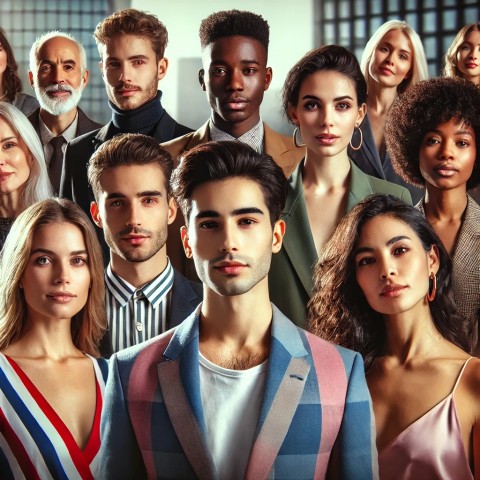The escort industry, like many other fields, is not immune to the complexities of race, gender, and sexuality. Whether we are examining the lives of New York escorts, who often navigate a fast-paced and highly competitive urban environment, or escorts in Los Angeles, where image and entertainment culture play a significant role, these aspects of identity intersect in ways that create unique challenges and opportunities for those working in the field. The concept of intersectionality, first coined by legal scholar Kimberlé Crenshaw, provides a framework for understanding how various forms of discrimination and oppression overlap and interact. In the context of escorting, intersectionality can help us explore how race, gender, and sexuality influence the experiences of escorts, the biases they face, and the strategies they use to navigate these challenges.
The Impact of Intersectionality on Race, Gender, and Sexuality in the Escort Industry
Intersectionality in the escort industry reveals the multifaceted nature of discrimination and privilege. Race, gender, and sexuality do not exist in isolation; rather, they intersect in ways that shape individuals' experiences in profound and often nuanced ways. For instance, a Black transgender woman working as an escort may face different forms of discrimination than a white cisgender woman. These differences are not just a matter of degree but of kind, as the specific stereotypes, prejudices, and systemic barriers they encounter vary based on their intersecting identities.
Race plays a significant role in the escort industry. Racial stereotypes and biases can influence clients' preferences and expectations, as well as the opportunities available to escorts of different racial backgrounds. For example, Asian women are often fetishized and exoticized, which can lead to increased demand but also objectification and dehumanization. Black women, on the other hand, may face both hypersexualization and racial discrimination, affecting their safety and earning potential. These racial dynamics are further complicated by the intersections of gender and sexuality, as the specific ways in which race influences experiences can differ greatly for men, women, and non-binary individuals.
Navigating Gender and Sexuality: Diverse Experiences Within the Escort Industry
Gender also intersects with race and sexuality in complex ways. The escort industry is heavily gendered, with distinct roles and expectations for male, female, and non-binary escorts. Female escorts often navigate a landscape where their gender is both a source of demand and a site of vulnerability. They may face gender-based violence, exploitation, and harassment, compounded by racial and sexual biases. Male escorts, while less visible in mainstream discourse, also face unique challenges, including stigma related to their masculinity and sexuality. Non-binary and transgender escorts, meanwhile, must contend with transphobia and gender-based discrimination, which can limit their opportunities and expose them to additional risks.
Sexuality is another crucial aspect of intersectionality in the escort industry. LGBTQ+ escorts often face a double burden of stigma: societal prejudices against sex work and discrimination based on their sexual orientation or gender identity. This dual stigma can lead to increased marginalization and vulnerability. For example, gay male escorts may encounter homophobia from clients and within the broader industry, affecting their mental health and professional opportunities. Lesbian, bisexual, and queer women, as well as transgender individuals, similarly navigate a complex web of biases and expectations, shaping their experiences in unique ways.
Systemic Discrimination and Resilience in the Escort Industry
Discrimination and bias are pervasive issues within the escort industry. Racial and gender biases can manifest in various forms, from overt racism and sexism to subtler forms of exclusion and marginalization. For instance, white escorts may be more likely to be featured prominently on agency websites or to receive higher rates, reflecting broader societal biases that valorize whiteness. Black and brown escorts, in contrast, may be subjected to lower rates, less visibility, and more stringent safety concerns. These disparities are not just reflective of individual prejudices but are embedded in the structures and practices of the industry itself.
Navigating these challenges requires resilience, strategy, and often, community support. Escorts of marginalized identities develop various coping mechanisms and strategies to mitigate the impacts of discrimination and bias. Building supportive networks, both online and offline, is a crucial strategy. These networks provide emotional support, practical advice, and a sense of solidarity, helping escorts navigate the complexities of their work. Additionally, many escorts engage in advocacy and activism, working to challenge and change the systemic inequalities within the industry.
Promoting Awareness and Inclusion: Addressing Intersectionality Through Education and Action
Education and self-awareness are also critical tools for navigating intersectionality in the escort industry. By understanding the specific ways in which race, gender, and sexuality intersect to shape their experiences, escorts can better anticipate challenges and develop effective strategies for addressing them. This might involve seeking out resources and training on topics such as racial justice, gender sensitivity, and LGBTQ+ inclusion, or engaging in self-reflection and dialogue with peers to deepen their understanding of intersectionality.
Moreover, clients and industry stakeholders also have a role to play in addressing intersectionality and fostering a more inclusive and equitable environment. Clients can educate themselves about the impacts of their preferences and behaviors, striving to treat all escorts with respect and dignity, regardless of their race, gender, or sexuality. Industry stakeholders, including agencies, online platforms, and advocacy organizations, can implement policies and practices that promote equity and inclusion. This might involve diversifying marketing materials, implementing anti-discrimination policies, and providing training and support for escorts of marginalized identities.
Toward an Inclusive Future: Embracing Intersectionality in the Escort Industry
Ultimately, addressing intersectionality in the escort industry requires a collective effort. It involves recognizing and challenging the systemic inequalities that shape the industry, as well as supporting and empowering escorts of all identities to thrive in their work. By embracing the principles of intersectionality, the escort industry can move towards a future that is more inclusive, equitable, and just for all.
Intersectionality provides a vital framework for understanding the complexities of race, gender, and sexuality in the escort industry. The unique challenges and opportunities that arise from these intersecting identities highlight the need for a nuanced and comprehensive approach to addressing discrimination and bias. By recognizing the diverse experiences of escorts and fostering a more inclusive and equitable environment, the industry can better support the well-being and success of all its members. This journey requires ongoing commitment, education, and action from all stakeholders, but the potential for positive change is immense. Through collective efforts and a deepened understanding of intersectionality, the escort industry can become a more just and supportive space for everyone involved.













